

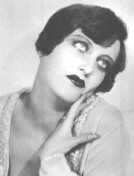
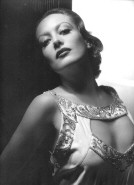




The Best of L
Lady of the Night. MGM silent, 1925. Directed by Monta Bell. Norma Shearer vehicle, with Joan making her very first film appearance (uncredited) as Shearer's double.
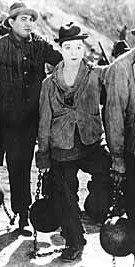 Langdon,
Harry. (6/15/1884 - 12/22/1944) Iowa-born comic who began his career
in vaudeville, debuting in film in 1923, in Mack Sennett short comedies. In
1926, he made his full-length feature debut in the First National film Tramp,
Tramp, Tramp, which co-starred Joan as his love interest.
Langdon,
Harry. (6/15/1884 - 12/22/1944) Iowa-born comic who began his career
in vaudeville, debuting in film in 1923, in Mack Sennett short comedies. In
1926, he made his full-length feature debut in the First National film Tramp,
Tramp, Tramp, which co-starred Joan as his love interest.
Said
Joan re working with Langdon (from JC: The Essential Biography
interviews with Lawrence J. Quirk. Editor's note: The "voice"
in the quote below sounds much too eloquent to be Joan's; perhaps
the sentiment was there but Quirk cleaned it up a bit):
I never thought he was a very happy person. There seemed to be some deep dark hole in him, a hole he could never seem to climb out of. Working with him was a very remote, detached experience. He put on the required gestures and expressions, but as soon as the camera stopped rolling, he retreated into his own private self. He was self-destructive, got too big a head, thought he knew it all....He could have had a much longer career if he had had more self- awareness, had had a more objective awareness of his weaknesses and his strengths.
Langdon Site More Langdon info IMDb entry
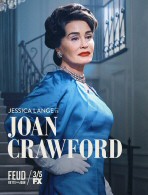
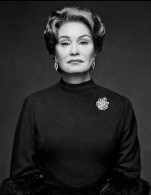 Lange,
Jessica. (4/20/49 -- ) Acclaimed
American actress who has won Oscars (Best Supporting Actress for
Tootsie, Best Actress for Blue Sky), Emmys (Grey
Gardens, American Horror Story), and a Tony (Long
Day's Journey Into Night).
Lange,
Jessica. (4/20/49 -- ) Acclaimed
American actress who has won Oscars (Best Supporting Actress for
Tootsie, Best Actress for Blue Sky), Emmys (Grey
Gardens, American Horror Story), and a Tony (Long
Day's Journey Into Night).
In 2017, Lange starred as Joan Crawford in the 8-part Ryan Murphy-created FX series Feud, an account of Joan and Bette Davis (portrayed by Susan Sarandon) during the filming of What Ever Happened to Baby Jane?.
Lange Wikipedia page. Feud Wikipedia page.
Click on either photo for over a dozen promo shots from show, including an interview with Lange on researching Joan and shots of Lange in 2017 at Joan's Grauman's footprints.
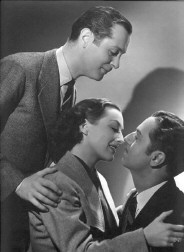 Last
of Mrs. Cheyney, The. MGM, 1937. Directed by Richard Boleslawski (who died
during filming; Dorothy Arzner, uncredited, finished it), 98 minutes.
This is a remake of a 1929 Norma Shearer film (based on the 1925 play by Frederick
Lonsdale), which was again remade in 1951 as The Law and the Lady starring
Greer Garson.
Last
of Mrs. Cheyney, The. MGM, 1937. Directed by Richard Boleslawski (who died
during filming; Dorothy Arzner, uncredited, finished it), 98 minutes.
This is a remake of a 1929 Norma Shearer film (based on the 1925 play by Frederick
Lonsdale), which was again remade in 1951 as The Law and the Lady starring
Greer Garson.
Here, Joan stars as jewel thief "Fay Cheyney" along with partner-in-crime William Powell (their only film together). Robert Montgomery is a lord in love with Fay who catches on to the partners' jewel-heist plan. Says Joan in CWJC: For years every time I though of "Mrs. Cheyney" I wanted to kick myself around the block. I didn't stink, like I did in "Rain," but at the time the film was made I was having personal problems and I let them get in the way. It showed; it was a beautifully put-together film, all the way, but I only did a three-quarter job. If I'd done it right I'm sure I'd have been nominated for an Oscar.
The Last of Mrs. Cheyney page.
Last Will and Testament, Joan's. Signed "Joan Crawford Steele" (and initialled "JCS" on each page) on October 28, 1976, Joan's 15-page will includes the now infamous codicil that so evoked the Wrath of Tina: "It is my intention to make no provision herein for my son Christopher or my daughter Christina for reasons which are well known to them." Click here for the complete text.
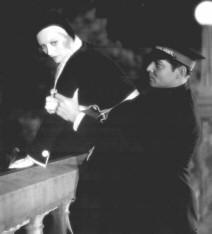 Laughing
Sinners. MGM, 1931. Directed by Harry Beaumont, 71 minutes. Joan stars as
nightclub singer
"Ivy Stevens" in her second film with Clark Gable, who plays a Salvation
Army officer intent on saving her from Neil Hamilton's wicked ways. Joan
dances and sings a number "What Can I Do?--I Love That Man!" The movie
is based on the play "Torch Song" by Kenyon Nicholson, which
debuted on Broadway the year before. (More "Torch"-related trivia:
Marjorie Rambeau,
who would go on to play Joan's mother in the '53 movie Torch
Song, co-stars as her chorus-girl buddy
here.)
Laughing
Sinners. MGM, 1931. Directed by Harry Beaumont, 71 minutes. Joan stars as
nightclub singer
"Ivy Stevens" in her second film with Clark Gable, who plays a Salvation
Army officer intent on saving her from Neil Hamilton's wicked ways. Joan
dances and sings a number "What Can I Do?--I Love That Man!" The movie
is based on the play "Torch Song" by Kenyon Nicholson, which
debuted on Broadway the year before. (More "Torch"-related trivia:
Marjorie Rambeau,
who would go on to play Joan's mother in the '53 movie Torch
Song, co-stars as her chorus-girl buddy
here.)
The movie was initially titled Complete Surrender and starred Johnny Mack Brown in the Gable role. Filming was complete, but then word started to come in that the Crawford/Gable chemistry in their recent first pairing Dance, Fools, Dance was creating a sensation with the public. Brown's scenes were scrapped and re-shot with Gable.
Says Joan in CWJC: "Laughing Sinners" was good for me--I danced well, acted well, and hit off a few sparks, on screen and off, with an up-and-coming young actor named Clark Gable. One of my favorites.
LaValley, Albert. Editor of the 1980 University of Wisconsin Press book Mildred Pierce, which contains the screenplay, photos, and a 42-page analysis of issues surrounding the film.
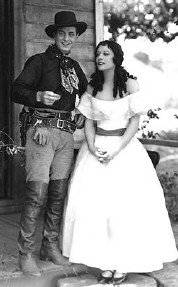 Law
of the Range. MGM silent, 1928, starring Tim McCoy. Directed by William
Nigh, 60 minutes. Joan's second film with Western star McCoy; she plays "Betty Dallas,"
who's torn between a good lawman and his wicked bandit brother.
Based on a story by Norman Houston. Says Joan in CWJC: Range was Tim McCoy's
picture--I walked through it, but agreeably, I guess.
Law
of the Range. MGM silent, 1928, starring Tim McCoy. Directed by William
Nigh, 60 minutes. Joan's second film with Western star McCoy; she plays "Betty Dallas,"
who's torn between a good lawman and his wicked bandit brother.
Based on a story by Norman Houston. Says Joan in CWJC: Range was Tim McCoy's
picture--I walked through it, but agreeably, I guess.
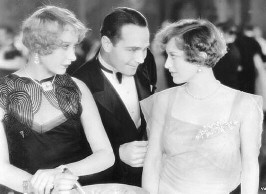 Lee,
Gwen. (11/12/04 - 8/20/61) Surprisingly,
this star of the silent era (who acted in films until 1938) holds the record
for most co-appearances with Joan, in 9 films: Lady of the Night (the
first film for both women) and Pretty Ladies (1925)
; Twelve Miles Out (1927); Untamed,
The Duke Steps Out, and Hollywood Revue of 1929 (1929); Our Blushing
Brides (1930); Paid (1930); and (uncredited)
in Mannequin (1938). Lee was a 1928 WAMPAS Baby Star (which
Joan had also been in 1926). IMDb info.
Lee,
Gwen. (11/12/04 - 8/20/61) Surprisingly,
this star of the silent era (who acted in films until 1938) holds the record
for most co-appearances with Joan, in 9 films: Lady of the Night (the
first film for both women) and Pretty Ladies (1925)
; Twelve Miles Out (1927); Untamed,
The Duke Steps Out, and Hollywood Revue of 1929 (1929); Our Blushing
Brides (1930); Paid (1930); and (uncredited)
in Mannequin (1938). Lee was a 1928 WAMPAS Baby Star (which
Joan had also been in 1926). IMDb info.
LeSueur, Anna Bell. See "Johnson, Anna Bell."

 LeSueur,
Hal. (9/3/03 - 5/3/63) Joan's n'er-do-well older brother. Says Joan in
CWJC:
LeSueur,
Hal. (9/3/03 - 5/3/63) Joan's n'er-do-well older brother. Says Joan in
CWJC:
He was chronically mean...as kids he wasn't just the type of kid that would pull wings off butterflies, he'd pull the arms and legs off my dolls. When my mother needed help in the house, did she ever ask him to do anything? Hell, no! I waited on him hand and foot, and he was one of the big reasons why I wanted to get the hell out of the whole situation. Hal was bad news, all the way around. But because he was a boy he was always favored, and it was Lucille who had to do all the dirty work...As soon as I had a few options renewed at Metro, Hal appeared. One afternoon I came home and found him sitting on my sofa, smoking a cigarette, half-bombed, telling me that since I'd become a movie star he was going to live with me. Like an idiot, I let him stay, but finally I sent for Mother and let those two live together so I could have a place of my own where I could maintain my privacy---and my sanity. Hal was a louse, an out-and-out bastard. He could charm the skin off a snake, but nothing, not his jobs, not the men and women in his life, lasted long. Liquor, then drugs, and always his distorted ego, took over. I supported that son-of-a-bitch until the day he died...At least Norma Shearer's brother, Douglas, was brilliant and self-sufficient, and made his own career at Metro. But I was stuck with a schmuck. That man--or did he ever become a man--was a monster. God, I hated him.
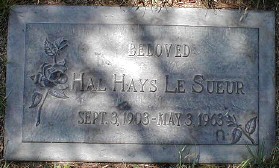 According to the IMDb,
he appeared in 21 movies between 1935 and 1942, all uncredited. (Including appearances
in the '35 Gable/Tone vehicle Mutiny on the Bounty and Joan's '37
film Mannequin.) He made one last--credited--appearance as "Reporter"
in the '57 biopic Jeanne Eagels, starring Kim Novak. When he died
from a ruptured appendix in 1963, he had sobered up and had been working as
a night-clerk in a motel; he is buried in Los Angeles's Forest Lawn cemetery.
(See also Anna
Bell Johnson and Family
Tree.)
According to the IMDb,
he appeared in 21 movies between 1935 and 1942, all uncredited. (Including appearances
in the '35 Gable/Tone vehicle Mutiny on the Bounty and Joan's '37
film Mannequin.) He made one last--credited--appearance as "Reporter"
in the '57 biopic Jeanne Eagels, starring Kim Novak. When he died
from a ruptured appendix in 1963, he had sobered up and had been working as
a night-clerk in a motel; he is buried in Los Angeles's Forest Lawn cemetery.
(See also Anna
Bell Johnson and Family
Tree.)
LeSueur, Lucille Fay. Joan's birth name.
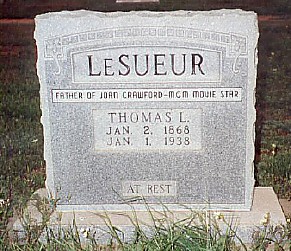 LeSueur,
Thomas E. (1/2/1868 - 1/1/1938) Joan's father, a
laborer who left the family
either before or shortly after Joan was born.
LeSueur,
Thomas E. (1/2/1868 - 1/1/1938) Joan's father, a
laborer who left the family
either before or shortly after Joan was born.
Joan grew up thinking her stepfather Henry Cassin was her real father, until her brother Hal told her the truth when she was about 11. Joan met LeSueur for the first time on the set of her 1934 movie Chained. After awkward attempts at establishing some sort of relationship, LeSueur quickly disappeared from her life again. In 1938, he died at age 70 and was buried in Abilene, Texas, where he had lived for over three decades.
See Family Tree for a photo of LeSueur. See his entry on RootsWeb.com for more information on him and his side of the family.
Two Abilene newspaper articles re LeSueur's death in 1938 (page includes larger gravestone photo).
Photo by Johnny Egger from the www.findagrave.com site.
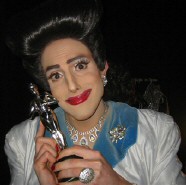 Lettuce,
Hedda. NYC-based drag performer who hosts the Chelsea
Cinema film tributes to Joan. From November
'03 to January '04, she also starred in the San Francisco staging of "Christmas
With the Crawfords." (See picture to right.)
Lettuce,
Hedda. NYC-based drag performer who hosts the Chelsea
Cinema film tributes to Joan. From November
'03 to January '04, she also starred in the San Francisco staging of "Christmas
With the Crawfords." (See picture to right.)
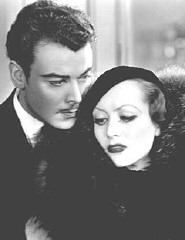 Letty
Lynton. MGM, 1932. Directed by Clarence Brown, 84 minutes.
Based on
the 1931 novel by Marie Belloc Lowndes, which was based on the actual story
of a Scottish girl named Madeleine Smith who attempted to poison her lover. Here,
Joan stars as
Letty, a socialite who has a vacation debauche with a South American (Nils
Asther) who then returns to New York City to stalk her. Robert Montgomery co-stars
as her new love interest.
Letty
Lynton. MGM, 1932. Directed by Clarence Brown, 84 minutes.
Based on
the 1931 novel by Marie Belloc Lowndes, which was based on the actual story
of a Scottish girl named Madeleine Smith who attempted to poison her lover. Here,
Joan stars as
Letty, a socialite who has a vacation debauche with a South American (Nils
Asther) who then returns to New York City to stalk her. Robert Montgomery co-stars
as her new love interest.
Joan's Adrian-designed wardrobe set off a nationwide fashion craze; according to the AMC site, the ruffled-shoulder dress sold 50,000 units at Macy's New York store alone. Says Joan in CWJC: Letty Lynton was even more of a smash for me [than Grand Hotel], personally. One hell of a story and script and a character I could really come to grips with, thanks to Clarence Brown again. (Adrian's costuming, by the way, was absolutely gorgeous, but he was so expert that he never made me feel as though I was being used as a clotheshorse.) If there is ever a Joan Crawford retrospective I hope they show this one; the acting may be a little out of style now, but not that much.
Letty is not widely available today because of a court case that MGM lost in 1936. Explains Mark Litwak on the filmmaking.com site:
In Sheldon v. Metro-Goldwyn Pictures Corp., MGM attempted to secure the movie rights to Edward Sheldon's copyrighted play “Dishonored Lady.” The play was based, in part, on a true historical incident in the public domain. When MGM was unsuccessful in negotiating to obtain the rights to the play, the studio produced a movie of its own, “Letty Lynton,” based on the same historical incidents that were the basis for Sheldon’s play. Although much of this movie was original, certain details and sequences of events were identical to those expressed in Sheldon’s play. The lower court held for MGM on the grounds that the material borrowed only involved general themes or ideas.
The appellate court disagreed concluding that there was an infringement. The court found that MGM’s work was identical in details and sequence of events to Sheldon’s work in matters unrelated to the underlying true story. The court reasoned that this borrowing was more than merely appropriating an idea or a theme. Some of the details and sequences of events in Sheldon’s play that were not historical facts in the public domain were also present in MGM’s movie. The court concluded that it didn’t matter that the plagiarized material comprised only a small portion of the film because it is not acceptable to steal a little bit.
Click here to read the complete court decision.
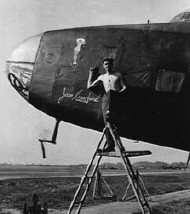 Lion
Squadron. Nickname for the 427 Squadron of the Royal Canadian Air Force,
which flew over 3200 bombing sorties over Europe in WWII. The squadron was formed
in 1942, and in May 1943 was adopted by MGM, which presented the company with
a bronze lion, thus giving it its nickname. Several planes were named after
MGM stars; along with the Halifax plane named after Joan (shown at right), other
stars so honored included Lana Turner, Greer Garson, and Hedy Lamarr. 427
Squadron site.
Lion
Squadron. Nickname for the 427 Squadron of the Royal Canadian Air Force,
which flew over 3200 bombing sorties over Europe in WWII. The squadron was formed
in 1942, and in May 1943 was adopted by MGM, which presented the company with
a bronze lion, thus giving it its nickname. Several planes were named after
MGM stars; along with the Halifax plane named after Joan (shown at right), other
stars so honored included Lana Turner, Greer Garson, and Hedy Lamarr. 427
Squadron site.
Loew, Marcus. Theater magnate who had just purchased MGM when Joan met him in the fall of 1924, introduced by club owner/radio star Nils Granlund. Loew was trying to persuade Granlund to star on the new radio station he was buying (WHN in New York), and Granlund in turn suggested that Joan might be what MGM was looking for. Loew and Granlund set up a screen test for her, shot by Edward "Major" Bowes in NY and sent to Culver City, California, MGM's home base. Several screen tests were rejected by California until Granlund personally asked Metro producer Harry Rapf to sign Joan.
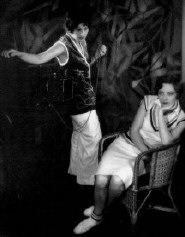
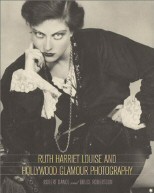 Louise,
Ruth Harriet. (1903 - 1940) Joan photographer and head of the MGM portrait studio from 1925 - 1930,
just prior to Hurrell
taking over. She
was considered the first woman photographer active in the Hollywood studios.
Recommended reading: Ruth Harriet Louise and Hollywood Glamour Photography
(pictured near left, University of California Press, 2002).
Louise,
Ruth Harriet. (1903 - 1940) Joan photographer and head of the MGM portrait studio from 1925 - 1930,
just prior to Hurrell
taking over. She
was considered the first woman photographer active in the Hollywood studios.
Recommended reading: Ruth Harriet Louise and Hollywood Glamour Photography
(pictured near left, University of California Press, 2002).
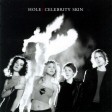 Love,
Courtney. Love's 1998 CD "Celebrity Skin" thanks "Miss Joan
Crawford," among others. And I found this Love quote somewhere, date now
unknown:
Love,
Courtney. Love's 1998 CD "Celebrity Skin" thanks "Miss Joan
Crawford," among others. And I found this Love quote somewhere, date now
unknown:
But I like being bad too. That's me. What can I do? I don't care. I came from shit. I came from nothing. I picked berries. I was a stripper - in bad bars. I'm happy and lucky to be doing what I'm doing now. Very lucky. I'll take the crap. I'll make it easier for the next one down the line. It wasn't as hard for me as it was for Chrissie Hynde and Joan Jett. And it wasn't as hard for them as it was for Janis Joplin. And it wasn't as hard for Janis Joplin as it was for Joan Crawford. When you're working class and you come from crap, man or woman, it's a hard road.
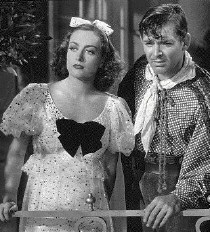 Love
on the Run. MGM, 1936. Directed by W.S. Van Dyke, 81 minutes. Joan stars
in this romp as heiress "Sally Parker," who's trying to escape an impending marriage
and is followed by two newspapermen (Clark Gable and Franchot Tone) trying to
get the scoop. Check out Joan's funny scenes in a country bumpkin outfit and
doing a bump-n-grind with a castle caretaker. It's her 7th film with Gable and 6th film with husband
Tone. Says Joan in CWJC: ...my first
real comedy in ages, and I enjoyed the hell out of it, particularly with Clark
and Franchot opposite. Not a big picture, but everyone I know who saw it seemed
to love the thing.
Love
on the Run. MGM, 1936. Directed by W.S. Van Dyke, 81 minutes. Joan stars
in this romp as heiress "Sally Parker," who's trying to escape an impending marriage
and is followed by two newspapermen (Clark Gable and Franchot Tone) trying to
get the scoop. Check out Joan's funny scenes in a country bumpkin outfit and
doing a bump-n-grind with a castle caretaker. It's her 7th film with Gable and 6th film with husband
Tone. Says Joan in CWJC: ...my first
real comedy in ages, and I enjoyed the hell out of it, particularly with Clark
and Franchot opposite. Not a big picture, but everyone I know who saw it seemed
to love the thing.
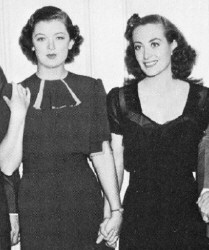 Loy,
Myrna. (8/2/05 - 12/14/93) Loy, born Myrna Williams
in Montana, made her film
debut in 1925 and also appeared that year with Joan in Pretty
Ladies. Initially
cast as vamps and exotics, she signed with MGM in 1932 and soon after (1934)
was cast as what would become her most famous role, Nora Charles in The
Thin Man series. In 1936 a nationwide poll named her "The Queen of
Hollywood." (Gable was named "King.") She made a total of 129
films and in 1991 was given the Lifetime Achievement Award by the Academy.
Loy,
Myrna. (8/2/05 - 12/14/93) Loy, born Myrna Williams
in Montana, made her film
debut in 1925 and also appeared that year with Joan in Pretty
Ladies. Initially
cast as vamps and exotics, she signed with MGM in 1932 and soon after (1934)
was cast as what would become her most famous role, Nora Charles in The
Thin Man series. In 1936 a nationwide poll named her "The Queen of
Hollywood." (Gable was named "King.") She made a total of 129
films and in 1991 was given the Lifetime Achievement Award by the Academy.
After their 1925 meeting, she and Joan remained life-long friends; Loy loyally left the room at Joan's Hollywood memorial service after Christina entered. (Side note: In the '60s, Christina appeared as Loy's daughter in a Chicago production of the play Barefoot in the Park. Joan bio The Last Word quotes Loy on Christina: "Her stubbornness was really unbelievable. She would not do a single thing that anyone told her to do....Christina completely disregarded her blocking, throwing the rest of us off." Christina was eventually fired after play author Neil Simon witnessed her performance.)
From Loy's autobiography Being and Becoming:
Bob
McIntyre gave me a consolation prize, a job in Pretty Ladies. That’s when
I met Joan Crawford. We were both chorus girls in this thing, which starred Zasu
Pitts and Tom Moore and featured Norma Shearer, Conrad Nagel, and a lot of
people impersonating Ziegfeld Follies stars. It’s amazing to think that Norma,
Joan, and I would all become rather important to MGM in later years. And here we
were, Joan and I, these two little extras, as part of a human chandelier. They
had us hanging on to this thing with our toes out, all these girls going in
different directions. It was a riot.
Joan had been signed to a contract, and
she was living on nothing but black coffee to slim down for the camera. She was
still Lucille LeSueur then. They ran a contest after Pretty Ladies to
find her a new name. Oh, she was wonderful! She was learning all the new dances,
Black Bottom, Charleston, and urging me to go down to the Ambassador and do them
with her. Being such a snob about dance, of course, I wouldn’t have any part of
it. But that’s what made her a star, later on, in Our Dancing
Daughters.
One day, Joan came into the dressing room
looking very unhappy. She fell into my lap – we were snowflakes covered with
marabou that kept getting into our mouths – and she began to cry. Joan always
worried terribly. I did, too, but never showed it. Apparently, Harry Rapf, the
producer who discovered her, had chased her around the desk the night before.
She was having a terrible time. She had such a beautiful body that they were all
after her. I didn’t have quite that much trouble – my sort of snooty attitude
put them off a bit.
Joan and I became friends and stayed
friends, which is the most that came out of my first MGM
experience.
 Lucky Number, Joan's.
According to The Ultimate Star (source of this picture of her '38 license plate), it was "7."
Lucky Number, Joan's.
According to The Ultimate Star (source of this picture of her '38 license plate), it was "7."
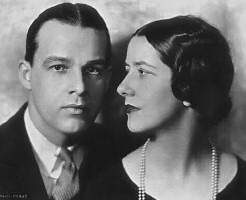 Lunt,
Alfred and Lynn Fontanne. American
Alfred Lunt (8/12/1892 - 8/3/1977) and Brit Lynn Fontanne (12/6/1887
- 7/30/1983) were Broadway's preeminent acting couple of the 20th
century. They married in 1922 and retired from the stage in 1958
after appearing together in over 20 plays. In 1964, both were presented
with the U.S. Presidential Medal of Freedom by President Johnson.
Broadway's Lunt-Fontanne
Theatre is named for them.
Lunt,
Alfred and Lynn Fontanne. American
Alfred Lunt (8/12/1892 - 8/3/1977) and Brit Lynn Fontanne (12/6/1887
- 7/30/1983) were Broadway's preeminent acting couple of the 20th
century. They married in 1922 and retired from the stage in 1958
after appearing together in over 20 plays. In 1964, both were presented
with the U.S. Presidential Medal of Freedom by President Johnson.
Broadway's Lunt-Fontanne
Theatre is named for them.
Despite their reputation as a "lavender" (gay) couple (Encyclopedia Britannica), the Lunts were apparently an inspiration for Joan to marry Franchot Tone in 1935. In her autobiography, Portrait of Joan, Joan writes, via Joan Kesner Ardmore: "One night in New York, Franchot and I went to supper at Alfred Lunt and Lynn Fontanne's [after their Broadway production of Taming of the Shrew]. The evening had the quality of a talisman, for they are inspiring people, and in real life as on stage, present each other in the most gracious light. Seeing how happy they were, I was ready to believe two careers could blend. Franchot and I became engaged."
Bette and Joan: The Divine Feud reports Joan as saying in 1935: "It was Alfred Lunt and Lynn Fontanne who made me change my mind about marriage. They managed to blend their professional achievements so magnificently well with their private life. They inspired Franchot and I to humbly enter the same happy union."
When Joan first met Fontanne in the early 1930s, Joan wondered which films of hers Fontanne had seen. Expecting to hear Possessed or Grand Hotel, Joan was embarrassed to learn that the one film seen thus far was 1928's Across to Singapore, a minor Silent potboiler. JC: The Essential Biography
The couple continued to correspond with Joan from their "Ten Chimneys" estate in Wisconsin until the 1970s. (See this site's Celebrity Letters to Joan page.)
Lunt Wikipedia entry. Fontanne Wikipedia entry.
Lux Radio Theater. Program that debuted on NBC in New York in 1934, then moved to CBS in Hollywood in July 1935. Cecil B. DeMille hosted the show from '36 to '45, and it went off the air in 1955 after 1041 broadcasts. Joan performed on this program 5 times: In 1935's "Within the Law"; 1936's "Chained"; 1937's "Mary of Scotland"; 1938's "Anna Christie" and "A Doll's House." See the Radio page for more specific program info. See also the Old Time Radio Log Lux page.
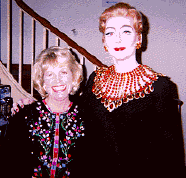 Lypsinka.
NYC-based drag artiste (real name, John Epperson) who, on May 6, 1998, first
re-created Joan's April 8, 1973, Town Hall interview as part of Christina Crawford's
appearance there to plug the 25th anniversary of Mommie Dearest. (Lypsinka
reprised the performance in 2003 and again in August 2004 at Manhattan's Show
nightclub. And in May/June of 2005 at the
Zipper Theatre in "The Passion of the Crawford," as well as in Los
Angeles in October 2005, with a show of the same name.)
Lypsinka.
NYC-based drag artiste (real name, John Epperson) who, on May 6, 1998, first
re-created Joan's April 8, 1973, Town Hall interview as part of Christina Crawford's
appearance there to plug the 25th anniversary of Mommie Dearest. (Lypsinka
reprised the performance in 2003 and again in August 2004 at Manhattan's Show
nightclub. And in May/June of 2005 at the
Zipper Theatre in "The Passion of the Crawford," as well as in Los
Angeles in October 2005, with a show of the same name.)
In 1999, Lyp began work on the much anticipated sequel to Trog--- Son of Trog! (Click here to see on-the-set photos and diary entries. What has become of this lost gem??) Lypsinka's "My Favorite Things" page has a Joan photo gallery and an explanation of what makes Joan so fascinating.